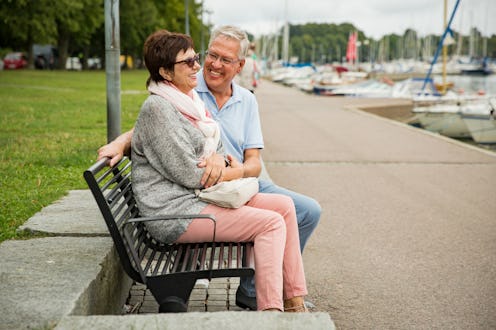
When we give compliments, we usually intend to lift their recipients up. But unfortunately, compliments can instead serve to put others down if they're not given thoughtfully. Because it's customary to compliment people based on arbitrary societal ideals, there are many common compliments you probably didn't realize were ageist, sexist, racist, and problematic in a slew of other ways. Ageist compliments are particularly common in our culture because older people — especially women — are taught to feel bad about themselves, and people are supposed to compliment them to make them feel less bad about their age. This whole premise is incredibly ageist, though. Assuming that someone feels bad about themselves is a bad start when you're trying to compliment them.
Though it may not be noticeable to younger people, ageism is an extremely strong force in our culture. Resumes indicating an older age are less likely to lead to interviews, according to a National Bureau of Economic Research study. According to another study in Psychological Science, people associate older people with negative words like "unpleasant" and "awful." This is because we've been taught that being younger is better than being older.
These problems are certainly worth combatting, but if you want to combat ageism, giving these common compliments is the wrong way to go.
1. "You're ___ For Your Age"
People deserve to feel good about themselves because of who they are, not despite it. When we tell people they have positive traits even though they're at the age they're at, what we're saying is that their age is a bad thing.
2. "You've Aged Gracefully"
When we say someone has aged gracefully, what we really mean is that they've aged less. If someone really looks like they've aged, we don't say they've aged gracefully. So, this compliment is really just a way of telling older people they look good because they don't look like who they are.
3. "You Have So Much Energy"
This implies that you wouldn't expect an older person to have a lot of energy, which may compliment the individual you're addressing, but still insults the group they belong to by treating them as the exception.
4. "You Must Have A Lot To Teach Us"
We all have things to teach one another, but just because someone belongs to a particular group (people with disabilities deal with this also) doesn't mean it's their responsibility to teach you.
5. "You've Really Kept Up With The Times"
Because older people are living under a rock and aren't normally in touch with politics or pop culture or technology? That's what this comment implies.
6. "You're So Cute!"
It's common to affectionately describe older people as "cute." But this term is infantilizing and condescending. You don't typically hear the word "cute" used to describe people the speaker has great respect for.
7. "Are You Her Sister?"
Asking someone if she's her child's sister is paying her a compliment by saying she looks younger than she is — but why is it a good thing to look young? This is only considered a compliment because we prize youth over age, and that attitude should be challenged, not made the basis for flattery.